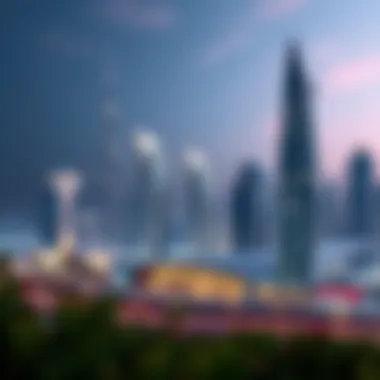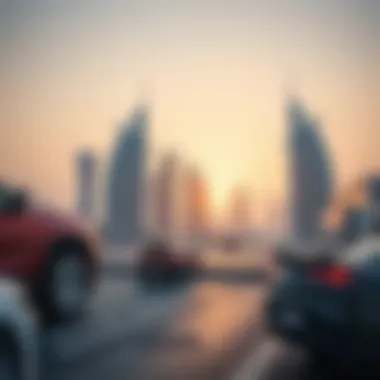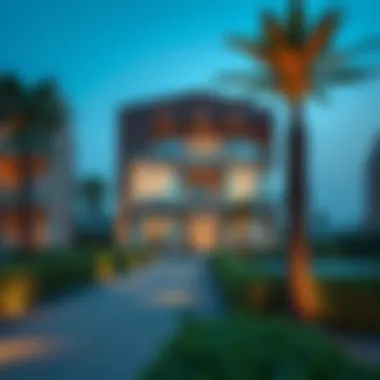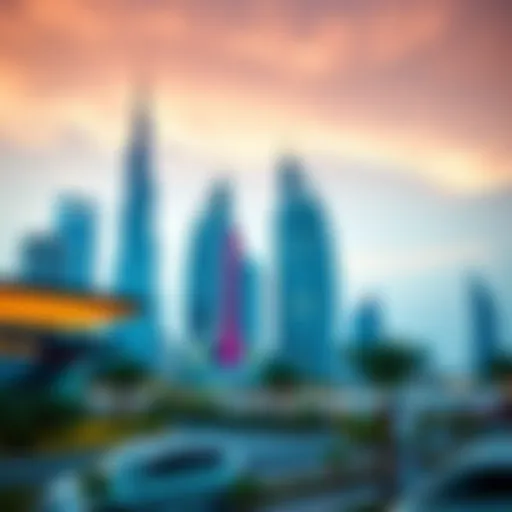Key Trends Shaping the UAE Landscape in 2024


Intro
The landscape of the United Arab Emirates (UAE) is constantly shifting, driven by a cocktail of innovation, economic strategy, and cultural evolution. As we step into 2024, major trends are emerging that redefine various sectors such as real estate, tourism, technology, and environmental initiatives. These trends not only reflect the aspirations of the UAE but are also critical indicators for investors, residents, and policymakers.
Understanding these trends provides an opportunity to navigate the region’s evolving market. With an eye on the future, stakeholders are poised to capitalize on the potential unlocking in the UAE’s latent opportunities. Let’s take a closer look at the significant market trends that are bound to shape the Emirates in the coming year.
Economic Overview of the UAE in
The economic landscape of the United Arab Emirates (UAE) in 2024 is poised for notable shifts, driven by a synergy of robust indicators and strategic governmental initiatives. Understanding this overview is vital for various stakeholders, particularly investors, real estate agents, homeowners, and policymakers. The UAE has carved out a reputation as a dynamic marketplace, and grasping the nuances of the current economic conditions can translate to informed decisions and strategic investments.
Current Economic Indicators
As we look into 2024, several key economic indicators reflect the UAE's fiscal health:
- GDP Growth: The UAE’s GDP is forecasted to grow at a rate of approximately 4.5%. This growth is underpinned by diversification efforts beyond oil dependencies, investing heavily in technology and service sectors, making the economy resilient and adaptive.
- Unemployment Rates: The unemployment rate is projected to remain low, hovering around 2.3% thanks to a surge in job creation in sectors such as tourism and technology.
- Inflation Rate: Inflation is expected to stabilize around 2.5%, influenced by global economic shifts and domestic consumption patterns. This stability is crucial for maintaining consumer confidence.
- Trade Balance: The UAE continues to enjoy a favorable trade balance, bolstered by its strategic geographical position, acting as a trade hub between East and West.
These indicators are not merely numbers; they paint a picture of a country that is not just reliant on past successes but is actively engaging in strengthening its economic framework.
Forecasts and Predictions
Looking ahead, experts forecast several trends that could significantly impact the UAE's economic narrative:
- Increased Foreign Investment: Policies aimed at attracting foreign direct investment (FDI) are expected to lead to a further influx of capital. This can be seen in the loosening of restrictions in several sectors, encouraging global businesses to set up shop in the Emirates.
- Focus on Sustainability: There is a clear pivot towards sustainability. Government initiatives are likely to encourage investments in renewable energy, especially solar and wind, which can see returns as the world becomes more environmentally conscious.
- Digital Transformation: The acceleration of digital economy strategies will likely result in more businesses adopting advanced technologies, thereby increasing productivity and efficiency.
"The transformative journey the UAE is on doesn't just promise growth; it signifies a complete evolution of its economic fabric, paving the way for a future that is not merely reactive but proactively shaping the global business landscape."
Investors should keep a close eye on these forecasts. Understanding the emerging landscape is essential for making prudent investments or business decisions that align with the UAE's forward-thinking trajectory.
These comprehensive indicators and predictions reveal that the UAE is on a path riddled with potential and opportunity. As the year unfolds, the importance of an astute understanding of these economic elements cannot be overstated for anyone looking to succeed in this captivating region.
Real Estate Market Dynamics
Real estate has always been a barometer of economic health and a catalyst for growth in the UAE. In 2024, this sector stands at the crossroads of significant transformation, marked by changing demographic patterns, technological advancements, and evolving investor sentiments. Understanding these dynamics is crucial, as they provide insights into the region’s broader economic landscape, the appeal to investors, and what potential homeowners can expect.
Emerging Neighborhoods
The fabric of urban development in the UAE is unfolding in exciting ways. New neighborhoods are cropping up, each aiming to cater to a diverse population seeking not just homes but also vibrant communities. For instance, areas like Dubai Creek Harbour and the upcoming Dubai South demonstrate the ambition of urban planners to create self-sufficient districts that combine residential, commercial, and recreational spaces.
- Dubai Creek Harbour: A waterfront community designed to offer sustainable living amidst lush parks and cultural institutions. The district aims to blend luxury with accessibility, making it a hit with younger families and expats looking to settle down.
- Dubai South: Focusing on an integrated living experience, it is positioned strategically near the Expo 2020 venue and the Al Maktoum International Airport, making it desirable for those working in logistics and trade.
These neighborhoods offer unique selling propositions that significantly appeal to various demographics, from affluent buyers to middle-class families. As a result, property developers are adapting to meet the changing demands, incorporating smart technology and eco-conscious designs.
Investment Trends
As the market evolves, so do the investment trends that dictate the flow of capital. Investors in the UAE are increasingly looking towards mixed-use developments, which offer both residential and commercial spaces. This trend caters to the growing need for convenience as people seek integrated lifestyles, where homes, workplaces, and leisure options coexist.
The concept of co-living spaces is gaining traction. These developments, often targeted at millennials, provide shared amenities while maintaining individual privacy and comfort. Investors find this model appealing due to lower vacancy rates and a steady influx of residents seeking flexibility and community.
Additionally, foreign direct investment in UAE real estate is likely to see a boost in 2024. With the government encouraging international ownership, projects that promote a blend of luxury and practicality are witnessing higher demand, providing investors with a robust avenue for returns.
Regulatory Changes Impacting Real Estate
In the realm of regulations, the UAE government is focused on nurturing a favorable investment climate. The easing of property ownership laws has opened doors for expatriates and non-residents, making it possible for more individuals to stake a claim in the booming market.
Notably, the introduction of long-term visas for investors and high net-worth individuals has reshaped the landscape. This move solidifies an intent to maintain a vibrant expatriate community that contributes significantly to the economy. Furthermore, initiatives promoting sustainability in construction are becoming the norm, as the government pushes for green credentials across developments, attracting conscientious investors.
"The regulatory shift not only increases transparency but also enhances investor confidence, crucial for tapping into the potential in the real estate market."
In summary, the real estate market dynamics in the UAE for 2024 reveal an intricate interplay of emerging neighborhoods, shifting investment strategies, and favorable regulations that aim to create a stable yet thriving environment for all stakeholders involved.
Technological Advancements
Technological advancements are more than just a buzzword in today’s fast-paced world. They signify the backbone of economic growth and social transformation in places like the UAE. With its vision firmly set on a future where innovation reigns supreme, the UAE has been continuously adapting and integrating cutting-edge technologies to streamline various sectors. It’s not just about keeping up with the world; it’s about staying ahead.
Smart Cities Initiative
The Smart Cities Initiative is a cornerstone of the UAE's technological landscape, aiming to enhance urban living through digital infrastructure and intelligent systems. What does this mean in practical terms? Streets that communicate, buildings that manage their energy consumption autonomously, and transport systems that optimize routes to reduce congestion. For investors and stakeholders, this isn’t just a futuristic vision; it’s an opportunity.
One of the key components of this initiative includes the implementation of smart grids and IoT devices across various sectors. For example, the city of Dubai is on a mission to integrate smart services that will improve efficiency in energy use and water consumption, ultimately translating into lower costs for both consumers and businesses.
- Benefits of the Smart Cities Initiative:
- Increased efficiency in service delivery.
- Enhanced livability for residents due to smart infrastructure.
- Reduction in operational costs, benefiting both private and public sectors.
With the UAE dedicating resources towards this initiative, the ripple effect will undoubtedly impact various industry verticals from real estate to retail, effectively nurturing a market ripe for investment in smart technologies.
Impact of AI on Various Sectors
Artificial intelligence is being woven into the fabric of everyday business operations in the UAE. Its implications stretch across numerous sectors, from healthcare to finance, enhancing productivity and decision-making processes. Consider healthcare, where AI algorithms are being used to predict patient outcomes, optimize treatment plans, and even diagnose diseases often with greater accuracy than human beings. This can save valuable time, resources, and ultimately lives.
Investors should look out for platforms harnessing AI capabilities to innovate product offerings or enhance operational efficiencies. In finance, for instance, AI-driven analytics are revolutionizing risk assessment and fraud detection methods. Such applications are not just impressive; they indicate where the economy is likely heading.
- Sectors Benefiting from AI:
- Healthcare: Faster diagnostics, personalized medicine.
- Finance: Enhanced fraud detection, automated trading systems.
- Retail: Improved customer service via chatbots and personalized marketing.
Harnessing AI could lead to unprecedented efficiency and cost-effectiveness for businesses looking to scale.
The convergence of technology and sector-specific strategies positions the UAE at the forefront of innovation, encouraging investors to consider not only current opportunities but also potential future avenues. As these technological advancements increasingly take root, they will shape the economy and society in significant ways, marking 2024 as a pivotal year in the UAE's ongoing evolution.
Tourism Expansion Plans


Tourism stands as a pivotal component of the UAE's economy, and the expansion plans for 2024 are set to further solidify this sector's importance. The UAE has long been a beacon for travelers seeking luxury, adventure, and cultural experiences. As the world continues to embrace travel post-pandemic, the UAE is positioning itself to capitalize on this renewed interest. By nurturing and diversifying tourist attractions, the country aims not only to enhance visitor experiences but also to bolster economic resilience.
The tourism expansion plans encompass various elements vital for development:
- Increased Infrastructure: Major upgrades to airports, hotels, and public transport systems are on the agenda. These enhancements are essential to accommodate the anticipated rise in tourist numbers.
- Attraction Variety: By introducing a wide array of attractions—ranging from entertainment complexes to cultural institutions—the UAE is appealing to different demographics, ensuring there's something for everyone.
- Sustainability Initiatives: Connecting tourism with sustainable practices is crucial. This commitment to eco-friendly approaches ensures that natural resources remain intact while still appealing to eco-conscious travelers.
Such robust plans promise numerous benefits. They position the UAE as a leading global tourist destination, can create thousands of jobs, and stimulate continued foreign investment. Moreover, with events and attractions planned around the UAE's unique heritage, local communities also stand to benefit significantly.
New Tourist Attractions
In 2024, several new tourist attractions are set to emerge across the UAE, each designed to provide unique experiences that cater to a broad audience.
One notable project is the alleged Dubai Tower, often whispered about as an endeavor to eclipse the heights of the Burj Khalifa. The proposed Dubai Tower aims to incorporate observation decks, parks, and entertainment zones, offering breathtaking views and a meticulously crafted environment for visitors and residents alike.
Also, developments like World of Adventures, near Dubai, will pack multiple theme parks and adventure zones into one sprawling area. This place is expected to attract family tourists who are keen on thrill rides, animal experiences, and immersive childhood adventures.
Furthermore, the introduction of immersive cultural experiences, such as the Qasr Al Watan, represents a shift toward edifying tourism. Visitors will have opportunities to engage with the UAE's rich history and cultural heritage, gaining insights into the nation's journey and technological advancements.
Cultural Events and Festivals
Cultural events and festivals are integral to the UAE's tourism strategy. These gatherings not only draw tourists but also offer unique insights into the local culture and customs. In 2024, an array of events are planned that celebrate this cultural tapestry, promoting understanding and appreciation among international visitors.
One of the highlights will be the Abu Dhabi Festival, showcasing a mix of classical and contemporary performances. Artists from various corners of the world will converge, fostering an environment of cultural exchange that resonates well with both inhabitants and visitors.
Another significant event, Dubai Shopping Festival, will be marked by offers that tantalize money spenders, alongside performances that showcase local talents. This blending of commerce with culture seeks to encapsulate the vibrant spirit of Dubai while boosting retail tourism.
"These cultural festivals not only enrich the visitor experience; they are a testament to our commitment to bridging the traditional with the modern, showcasing the UAE's rich heritage on a global stage." – A statement by the UAE Ministry of Culture.
As the planning evolves for these cultural experiences, there’s an expectation that they will draw visitors who seek more than just leisure. Knowledgeable travelers are looking for authentic experiences and connections to local cultures. As the UAE meets this demand through thoughtfully curated events, it stands to gain further respect and stature as a formidable player in the global tourism market.
Environmental Sustainability Initiatives
The importance of environmental sustainability initiatives in the UAE can’t be overstated, especially as the country positions itself against the backdrop of rapid urbanization and climate change. These initiatives serve not only to protect the environment but also to set a global example of how economic growth and environmental care can coexist. As the UAE eyes a future where the balance between modernization and preservation is paramount, understanding these sustainability efforts becomes essential not only for investors but for everyone involved in the ecosystem.
Renewable Energy Projects
In 2024, the United Arab Emirates is making strides in renewable energy projects that showcase its commitment to decreasing reliance on fossil fuels. The Mohammed bin Rashid Al Maktoum Solar Park is a shining example, considered one of the largest single-site solar parks in the world. As the nation invests heavily to reach its goal of generating 50% of its energy from clean sources, projects like this don’t merely reflect ambition; they also create significant opportunities for stakeholders across various sectors.
These initiatives are not just big-ticket items. Communities are seeing smaller scale projects too, such as localized solar installations that enable homeowners and businesses to harness solar power and reduce energy bills. The beauty here is that these larger projects will push the infrastructure needed for smaller, decentralized energy solutions, further expanding potential investment opportunities.
- Benefits of Renewable Energy Projects:
- Enhanced energy security
- Long-term cost savings
- Job creation in emerging green sectors
As opportunities for collaboration arise—from technology firms to construction companies—investors can find a wellspring of growth through these renewable energy initiatives. The trick will be in staying informed and discerning where the best investments lie.
Conservation Efforts in Urban Areas
In urban spaces, conservation efforts are essential to mitigate the environmental impact of growth. Cities like Dubai and Abu Dhabi are undergoing significant transformations as they integrate green spaces into their urban planning. The Dubai Urban Master Plan 2040 aims not only to double the green areas but also to promote eco-friendly living.
Such efforts may seem disconnected from profit margins, but there's a direct correlation between greener cities and higher property values. Homeowners increasingly seek eco-friendly neighborhoods with parks, shaded areas, and green roofs. For investors and real estate agents, recognizing this trend will help align their portfolios with the shifting demands of buyers who prioritize sustainability.
“It’s not just about building tall skyscrapers anymore; it’s about building a livable environment.”
- Conservation Strategies Include:
- Urban biodiversity projects to protect native species
- Sustainable water management practices
- Promotion of public transportation to reduce carbon footprints
With increasing awareness of climate challenges, the need for conservation efforts becomes more pressing. Governments, investors, and communities must work in tandem to cultivate urban environments that promise long-term sustainability. The initiatives in 2024 will prove foundational in further transforming how society interacts with their surroundings, creating a future that values environmental integrity in its urbanscapes.
For more details on sustainability efforts and their impact, visit Wikipedia or refer to studies on urban conservation Britannica.
As the emergence of such projects shapes the landscape of the UAE, both investors and residents can expect to see interconnected benefits that promote an integrated approach to growth and sustainability.
Healthcare Developments
The healthcare sector in the UAE is undergoing a radical transformation as it gears up for 2024. This evolution is not only about keeping pace with global standards but also about ensuring that the population has access to world-class medical services. The significance of these developments lies in their ability to enhance the health and well-being of residents, foster economic growth, and attract international investment. As healthcare quality improves, it reflects directly on the overall quality of life in the UAE, making it an attractive destination for expatriates and tourists alike.
Innovations in Medical Technology
Recent advancements in medical technology have paved the way for a paradigm shift in how healthcare is delivered in the UAE. Hospitals and clinics are increasingly integrating cutting-edge tools to provide better patient care. For example, telemedicine has gained traction due to its convenience and ability to bridge the gap between patients and healthcare professionals. This service enables patients to consult with doctors from the comfort of their homes, thereby reducing waiting times and improving accessibility.
Moreover, the adoption of artificial intelligence is reshaping diagnostics. AI algorithms can analyze medical data with remarkable speed and accuracy, helping doctors make well-informed decisions. Take the use of AI in radiology, for instance. It allows for quicker interpretation of imaging results, enhancing the efficiency of the diagnostic process. With UAE's commitment to innovation, health tech startups are emerging, driving forward new solutions to prevalent medical challenges within the region.
Healthcare Accessibility Improvements
In tandem with technology, accessibility improvements in healthcare are taking center stage in the UAE. The government is keen on increasing healthcare reach, especially in underserved areas. One significant initiative is the expansion of mobile clinics, which bring services directly to communities that may otherwise lack adequate medical facilities. These mobile units provide essential services such as vaccinations, health check-ups, and education about disease prevention.
Additionally, new policies set forth by the UAE Ministry of Health aim to streamline healthcare services for expatriates, ensuring that they receive comprehensive medical attention without a tangled bureaucracy. Such measures include partnerships with international health organizations, aimed at elevating standards and expanding offerings available to residents.
"Access to quality healthcare is a fundamental human right, and the UAE is making strides to ensure that all its residents receive what they deserve," a spokesperson from the Ministry noted.
As the UAE continues to grow as a global hub, both in commerce and living, these healthcare developments are crucial for maintaining a healthy workforce and improving the nation’s reputation abroad. Investors looking at this sector should pay attention to how these innovations could potentially yield high returns in a rapidly changing landscape.
Education Sector Advancements
The education sector in the UAE is undergoing remarkable changes as it heads into 2024. This transformation is built on the foundation of a rapidly evolving educational landscape that seeks to cater to the needs of a diverse and growing population. The importance of these advancements cannot be overstated, as they will play a crucial role in preparing the next generation of leaders, innovators, and skilled professionals necessary for sustaining the economy.
By addressing the gap between traditional education models and the skills required in the 21st century labor market, educational institutions in the UAE aim to foster a versatile workforce capable of navigating complexities in various sectors, from technology to sustainability. Moreover, these advancements are aligned with the government's broader vision of diversifying the economy and enhancing the overall quality of life for residents.
New Educational Institutions


In 2024, the openings of several new educational institutions are set to reshape the landscape of learning in the UAE. These institutions range from universities offering cutting-edge research programs to vocational schools dedicated to practical skills training. Some notable examples include:
- The International University of Artificial Intelligence: Aiming to produce experts in AI and machine learning, this institution will contribute to the tech-centric vision of the UAE.
- UAE Academy of Sustainable Development: This school will focus on equipping students with knowledge of sustainability practices, addressing one of the pressing challenges of our time.
These new entities not only add diversity to the educational offerings but also attract international students and faculty, creating a melting pot of ideas and cultures. The collaboration with global educational bodies further ensures that the curriculum is relevant, innovative, and competitive on a worldwide scale.
Curriculum Reforms and Innovations
Education reform is essential for any nation committed to progress, and the UAE is no exception. In 2024, curriculum reforms will be at the forefront of educational advancements, designed to incorporate practical skills alongside theoretical knowledge.
Key reforms will include the integration of:
- Digital Literacy Programs: As technology continues to evolve, students will be exposed to coding, digital marketing, and data analysis from an early age.
- Project-Based Learning: This approach emphasizes collaboration and real-world problem-solving, encouraging students to work on projects that have tangible outcomes.
- Soft Skills Development: Recognizing the importance of skills such as communication, teamwork, and emotional intelligence, curricula will incorporate training modules aimed at enhancing these competencies.
These innovations reflect a recognition of the shifting demands from employers who are looking for more than just academic knowledge.
"The ultimate goal is to ensure that students are not just job-readers, but job-makers."
Transportation and Infrastructure Developments
Transportation and infrastructure developments sit at the core of the UAE's rapid evolution. With a bustling economy and a diverse population, the demand for efficient transport systems and top-notch infrastructure is essential. Successful transportation networks facilitate trade, enhance connectivity, and improve the overall quality of life for residents and visitors alike. In 2024, as the UAE pushes further into a dynamic future, attention to transportation and infrastructure remains a crucial focus area.
Major Projects in Progress
In recent years, the UAE has embarked on several high-profile transportation projects aimed at easing congestion, improving accessibility, and promoting economic growth. Notable projects include:
- Hyperloop: The ambitious Hyperloop project proposes a transportation system where pods will travel through a low-pressure tube at high speeds. This initiative could potentially reduce travel times between key cities like Abu Dhabi and Dubai to mere minutes, promoting intercity economic activity.
- Etihad Rail: This rail network is designed to connect all emirates, facilitating the smooth movement of goods and people. The first phase is already underway and set to be completed by 2024, promising to create an efficient logistics backbone for the region.
- Dubai Metro Expansion: Continuing its reputation for state-of-the-art public transport, Dubai Metro is expanding its service lines. The ambitious plans aim to connect more neighborhoods and key business districts, reducing car dependency and leaving a smaller carbon footprint.
These projects highlight a forward-thinking approach and an unwavering commitment to modernizing and enhancing the region's infrastructural capabilities. As these initiatives roll out, they are set to handle increased population densities and cater to a growing number of visitors, making mobility smoother for everyone.
Public Transport Enhancements
The UAE's public transport enhancements draw focus on improving the commuter experience. The government is making significant strides in this area, reflecting a shift toward sustainable and eco-friendly transport solutions. Several key improvements to watch include:
- Smart Ticketing Systems: The introduction of contactless payment options and mobile ticketing is sharpening efficiency in public transport usage. Commuters can easily swipe their cards or tap their phones, making the process hassle-free.
- Integration of Transport Modes: Enhanced connectivity across various transport modes such as buses, trams, and the metro is on the agenda. An interconnected network means commuters can switch seamlessly between different systems, saving time and reducing congestion, while making the city more accessible.
- Focus on Sustainability: The incorporation of electric and hybrid buses is gaining momentum. This switch not only aims to improve air quality but aligns with the UAE's broader commitment to sustainability initiatives. The introduction of charging infrastructure to support electric buses is part of the deal, signaling a future where public transport is both efficient and environmentally friendly.
Through these enhancements, public transport in the UAE is evolving into a more comprehensive system that prioritizes not just speed but also sustainability. As these developments take shape, the UAE's transport landscape in 2024 will likely set a new standard for urban mobility, making it easier for residents and visitors to navigate a rapidly growing region.
"Investment in transportation infrastructure is not just about improving roads and rails; it’s about creating opportunities for growth and development for future generations."
Investors, developers, and policymakers should keep a close eye on these transportation and infrastructure developments, as they promise to reshape both the economy and the daily lives of those who call the UAE home.
Digital Economy Growth
The digital economy has emerged as a pivotal aspect of global financial landscapes, and the UAE is no exception. Recognizing the potential, the government has taken significant steps to integrate digitalization across various sectors. In 2024, the focus on digital economy growth is expected to accelerate, reflecting the commitment to enhance innovation, efficiency, and competitiveness in the market.
E-commerce Trends
The e-commerce sector is showing no signs of slowing down. Quite the contrary – it’s booming. With a surge in internet access and mobile penetration, more people are shopping online than ever before. In fact, reports indicate that online shopping in the UAE is projected to grow extensively, with consumers favoring the convenience and speed of e-commerce platforms.
A few key trends have emerged:
- Social Commerce: Social media platforms are becoming e-commerce hubs. Brands are leveraging Instagram and Facebook to create seamless shopping experiences for users.
- Personalization: Customers expect tailored experiences, which means companies are harnessing user data to create personalized shopping journeys.
- Sustainable Practices: An increasing number of online retailers are adopting eco-friendly practices to attract a conscientious consumer base. The shift toward sustainability is not just a trend; it’s becoming a requirement in appealing to newer generations.
"The future of retail lies heavily in digital landscapes that prioritize both customer experience and sustainability."
These trends present opportunities, particularly for investors and entrepreneurs who wish to tap into the surging demand for online services in various niches.
Investment in Startups
The startup ecosystem in the UAE is evolving rapidly. In 2024, investments in technology startups are set to soar, driven by a combination of favorable governmental policies and the presence of venture capital firms looking for the next big breakthrough. Notably, sectors like fintech, health tech, and edtech are attracting significant attention.
Some noteworthy considerations include:
- Government Support: Initiatives like the Dubai Future Accelerators are fostering an environment ripe for innovation, granting startups access to resources, mentorship, and potential funding.
- A Growing Network: The networking opportunities presented by events such as GITEX and other tech conferences allow startups to connect with potential investors and collaborators.
- Emerging Talent Pool: A blend of local and international talent is contributing to the startup scene, bringing diverse perspectives and expertise.
Cultural and Social Changes
Cultural and social changes in the UAE are pivotal components of its growth narrative, particularly as the nation gears up for 2024. With a rich tapestry of cultures interwoven throughout this vibrant country, it's crucial to understand how these dynamics influence various sectors such as real estate, tourism, and technology. The UAE stands at a crossroads, merging traditional values with modern practices, forging an identity that embraces both heritage and innovation.
Impact of Globalization
As the world becomes increasingly interconnected, the effects of globalization are evident in the UAE's cultural landscape. The influx of expatriates and tourists has propelled the rise of diverse cultural expressions, leading to the blending of traditions that were once geographically confined. This phenomenon has not only expanded the UAE’s cultural offerings but has also enriched the daily lives of its residents.
- Diverse Cultural Festivals: The UAE now hosts a variety of festivals that celebrate global cultures - from the Bollywood film fest to the Abu Dhabi Film Festival. Such events do not just promote tourism; rather they also foster understanding and appreciation among communities, thereby strengthening social bonds.
- Culinary Fusion: The vibrant food scene mirrors this cultural melting pot, with restaurants showcasing dishes from around the globe while incorporating local flavors. This culinary diversity reflects a broader acceptance and willingness to explore the 'other,' bridging gaps between different communities.
However, challenges accompany these transformations, such as navigating cultural sensitivities and maintaining the balance between preserving local identity and embracing wider cultural influences. Policymakers must tread carefully to ensure that the rapid expansion does not dilute the intrinsic cultural values that the UAE aims to protect.
Community Engagement Initiatives
Engagement initiatives within the community serve as a cornerstone for nurturing a harmonious societal fabric in the UAE. Various programs aim to enhance interaction among residents, leading to social cohesion and a sense of belonging. These initiatives are not only beneficial for community spirit but also serve as a catalyst for attracting investments.
- Volunteer Programs: Numerous organizations have sprung up, encouraging citizens and expatriates alike to participate in activities that benefit local communities. From beach clean-ups to educational workshops, these efforts foster collaboration and strengthen ties.
- Cultural Exchange Programs: Educational institutions and nonprofits are creating platforms for exchanging ideas and experiences. These programs, which often facilitate dialogue among different cultural groups, promote understanding and help mitigate prejudices.
"A society that thrives on mutual respect and understanding is one that grows resilient against challenges."
Investors and developers can benefit from these community-focused initiatives, as they contribute to a more engaged populace that invests not only in their neighborhoods but also in the broader economic ecosystem of the UAE. The push for community engagement can create attractive opportunities for investments in infrastructure projects and social enterprises that align with the needs of the community.
In summary, the cultural and social changes seen in the UAE are both reflective of and responsive to global and local imperatives. By taking these shifts into account, stakeholders can better navigate and contribute meaningfully to the evolving landscape of this dynamic region.
Challenges Facing the UAE


Understanding the challenges the UAE faces as it navigates its path toward growth is critical. As this region continues to transform into a global hub for trade, tourism, and innovation, it encounters several hurdles that could potentially slow its momentum or redirect focus. These challenges are not just obstacles; they offer lessons and opportunities for investors, policymakers, and residents alike.
Economic Diversification Hurdles
The UAE has long been recognized for its booming oil and gas industry, yet the ongoing fluctuations in global oil prices have underscored the risks of relying heavily on this sector. Thus, the nation is actively seeking to diversify its economy, aiming to boost industries like tourism, manufacturing, and tech. However, this is no walk in the park.
Some key difficulties surrounding economic diversification include:
- Skill Gaps: A significant mismatch exists between the skills demanded by new industries and those that the current labor force possesses.
- Investment Allocation: Allocating funds effectively across emerging sectors without neglecting traditional ones poses a dilemma for policymakers.
- Global Competition: Competing with other nations for foreign direct investment requires not only economic incentives but also social stability and infrastructure readiness.
These hurdles can create a bottleneck that stifles progress. Yet, overcoming them can ultimately lead to a more robust and resilient economy.
Environmental Concerns
As one of the most rapidly developing nations, the UAE's growth comes with significant environmental challenges. Rapid urbanization and industrialization have led to increased pollution, water scarcity, and biodiversity loss. Addressing these concerns is not merely a matter of compliance with international standards; it's an essential governance responsibility.
Some pressing environmental issues include:
- Water Scarcity: The UAE relies heavily on desalination, yet the process is energy-intensive and can have environmental repercussions.
- Air Quality: Industrial emissions and vehicular pollution contribute to deteriorating air quality, which poses health risks.
- Waste Management: With growing urban populations, effective waste management systems are necessary to mitigate landfill use and promote recycling.
Addressing environmental issues proactively can transform challenges into opportunities for innovative solutions, paving the way for sustainable development.
Moving forward, tackling these economic and environmental challenges will require targeted policies and collaboration across various sectors. By understanding these hurdles, the UAE can not only enhance its development trajectory but also create appealing prospects for investors in sustainable and diverse markets.
Future Outlook for the UAE
The discussion surrounding the future outlook for the UAE in 2024 is not merely a conversation about numbers on a spreadsheet. It embodies the aspirations of a nation that is constantly evolving and innovating amid a rapidly changing global landscape. Evaluating future trajectories helps investors, policymakers, and community stakeholders harness opportunities while mitigating vulnerabilities inherent in economic and social transformations.
Predictions for Economic Performance
As we glance ahead, the UAE’s economy is expected to remain robust, buoyed by diversification efforts and advancements in key sectors. Economic indicators from early 2024 suggest a projected GDP growth rate of around 4-5%, significantly influenced by a resurgence in global trade and heightened consumer confidence post-pandemic.
- The oil sector, while historically significant, is anticipated to have its power diminished by increasing investments in renewable energy sources. The UAE aims to lessen its dependency on hydrocarbons, and this shift could foster sustainable economic practices.
- The burgeoning tech industry, fueled by initiatives aimed at attracting startups and foreign investments, is making waves. This growth will likely attract venture capital, as new business models emerge to cater to changing consumer behavior driven by digital transformation.
- Tourism is on the rise again, with various international events scheduled throughout the year, including the Expo 2024. This will further draw tourists to attractions, helping sectors like hospitality and retail rebound strongly.
Critics may argue that geopolitical tensions and fluctuating oil prices pose considerable risks, but the UAE’s proactive approach to economic resilience suggests that these challenges are manageable. Fostering a knowledge-based economy could significantly fortify future economic performance. In summary, while uncertainties linger, the landscape remains buoyant, ready to seize growth opportunities amidst potential headwinds.
Long-term Development Plans
The long-term development plans for the UAE express a visionary intent that harmonizes cultural heritage with futuristic aspirations. These initiatives spotlight strategic frameworks that prioritize sustainability, innovation, and economic diversification.
Key developments include:
- Vision 2030: Continuing from the previous economic vision, the government's Vision 2030 aims to enhance the UAE’s competitiveness globally. Efforts are focused on sectors like education, technology, and health, indicating a roadmap for holistic development.
- Infrastructure: Ongoing infrastructure enhancements are pivotal. Major projects like the expansion of airports and roads show an intent to reinforce the UAE's position as a global hub for business and tourism. This aligns with the increase in air traffic and global trade.
- Green Initiatives: Environmental sustainability holds a prime position in long-term planning. As the nation gears up to host various environmental expos and forums, initiatives aimed at achieving carbon neutrality by 2050 reflect a commitment to combating climate challenges.
"The nation’s commitment to innovation and sustainability can light the path ahead, making the UAE not just a place of opportunity, but an example for others to follow."
For more insights, you can visit resources such as Wikipedia, Britannica, or follow related topics on forums like Reddit to keep abreast of the evolving landscape.
Government Initiatives and Policies
The sociocultural and economic landscape of the UAE is continuously evolving, with government initiatives and policies playing a crucial role in this transformation. In 2024, these strategies not only shape the nation’s growth trajectory but also address the needs of diverse stakeholders, including investors, residents, and developers.
The government’s approach emphasizes collaboration across various sectors, aiming to foster innovation and ensure sustainability. By adapting regulations and frameworks to better suit new market conditions and emerging trends, authorities can effectively navigate challenges and harness opportunities. A solid understanding of these initiatives is vital for anyone looking to invest or operate in the UAE.
Vision Framework
At the core of the UAE's forward-thinking policies is the Vision 2030 Framework. This comprehensive agenda is set to reshape the UAE into a global hub for business and tourism, while also prioritizing innovation and knowledge economy. Key aspects of Vision 2030 include:
- Diversification of the Economy: Reducing reliance on oil revenues by supporting growth in sectors like technology, tourism, and finance.
- Sustainability Goals: Investing in renewable energy and promoting environmentally friendly practices across industries to mitigate climate change.
- Cultural Development: Enhancing the cultural landscape with initiatives such as museums, art districts, and cultural festivals that celebrate diversity and heritage.
The Vision 2030 Framework offers a structured path towards achieving these ambitious targets. This roadmap gives confidence to investors and stakeholders, knowing that their involvement will contribute to a more robust and diversified economy.
Supportive Regulatory Environment
Another essential aspect is the Supportive Regulatory Environment, which is designed to facilitate easier market entry and enhance operating conditions for businesses. The government is keen on simplifying processes to attract foreign investment and encourage local entrepreneurship. Some highlights include:
- Incentives for Foreign Investors: Enhanced benefits for international businesses, such as 100% ownership in specific sectors and tax exemptions for certain durations.
- Streamlined Licensing Processes: Reducing the bureaucracy associated with starting and running a business can lead to quicker establishment, attracting more entrepreneurs and startups.
- Continuous Policy Review: Regular assessments of existing laws and regulations ensure that they remain relevant and competitive in the ever-evolving global market.
Successful implementation of these policies not only supports current businesses but also lays the groundwork for future innovations and market entries.
"The UAE’s proactive approach to regulation positions it as a competitive player on the global stage, making it easier for enterprises to thrive."
In summary, the government’s strategic initiatives and responsive regulatory environment are fundamental elements driving growth and stability in the UAE as it moves toward the future. Investors, real estate agents, and developers must keep abreast of these developments, as they will have far-reaching implications for various sectors and opportunities within the region. Understanding how these changes will shape the business environment is key to making informed decisions in 2024 and beyond.
Public Safety and Security Measures
In an ever-evolving landscape influenced by technology and societal shifts, the importance of public safety and security measures in the UAE is paramount, especially as the nation gears up for 2024. The interplay between innovation and safety ensures that both citizens and visitors feel secure amidst rapid development. With urbanization progressing at a dizzying pace and the annual influx of tourists, the need for robust safety protocols cannot be overstated.
To maintain a thriving environment, the government and various organizations are becoming increasingly proactive about their safety measures. This not only bolsters public confidence but also attracts potential investors and businesses aiming to establish roots in a secure marketplace. The critical elements that are shaping safety strategies in the UAE include comprehensive cybersecurity frameworks and meticulously crafted emergency preparedness protocols.
Cybersecurity Strategies
In the digital age, cybersecurity strategies hold a crucial place in safeguarding sensitive information and protecting citizens from cyber threats. The UAE has made significant strides in developing a cybersecurity framework that anticipates risks and actively combats them. This framework is constructed on several foundational elements:
- National Cybersecurity Strategy: Established by the UAE government, this strategy outlines a holistic approach to protect vital infrastructure and information systems.
- Public-Private Partnerships: Collaboration between government agencies and private sectors strengthens the cybersecurity landscape, sharing valuable insights and resources.
- Awareness Programs: Regular training and awareness programs help educate both public and private entities about prevalent cyber threats.
As cyberattacks become more sophisticated, the focus on deepening such strategies also includes embracing the latest technology to mitigate risks. The UAE is heavily investing in AI to detect unusual patterns and enhance response times. This not only bolsters national security but also builds resilience among businesses, ensuring they can operate smoothly even amidst threat landscapes.
Emergency Preparedness Protocols
On a different yet equally important front, the effectiveness of emergency preparedness protocols cannot be dismissed. The UAE has experienced its share of challenges, be they natural disasters or security threats, and preparedness is key in these respects. The following components are integral to the UAE's emergency systems:
- Regular Training Drills: First responders and citizens alike undergo routine training to ensure a swift response if threads arise. These drills help in refining communication flows and operational efficiency.
- Resource Allocation: Adequate resources are earmarked for emergencies, including ambulances, fire services, and specialized units trained to handle crises effectively.
- Information Dissemination: The system of alerts and updates ensures that information reaches the public without significant delay.
- Community Involvement: Engagement with community members in creating safety plans involves everyone, making them more vigilant and prepared.
"Preparedness is not just a priority; it’s a way of life in the UAE. A nation that invests in its safety, invests in its future."
While challenges persist, the continuous improvements in these protocols foster a general sense of security, emboldening residents and would-be investors alike. The UAE stands at the thrilling intersection of growth and security, emphasizing that as opportunities arise, so too must the vigilance to protect them. The confluence of innovative cybersecurity and well-honed emergency response systems assures that the nation is not only ready for 2024 but is also laying a solid foundation for the future.











